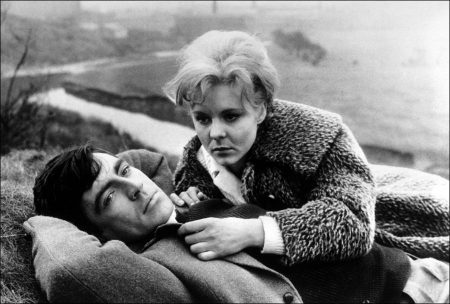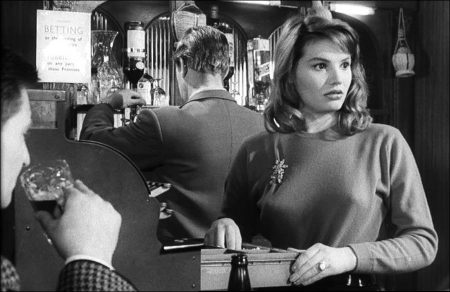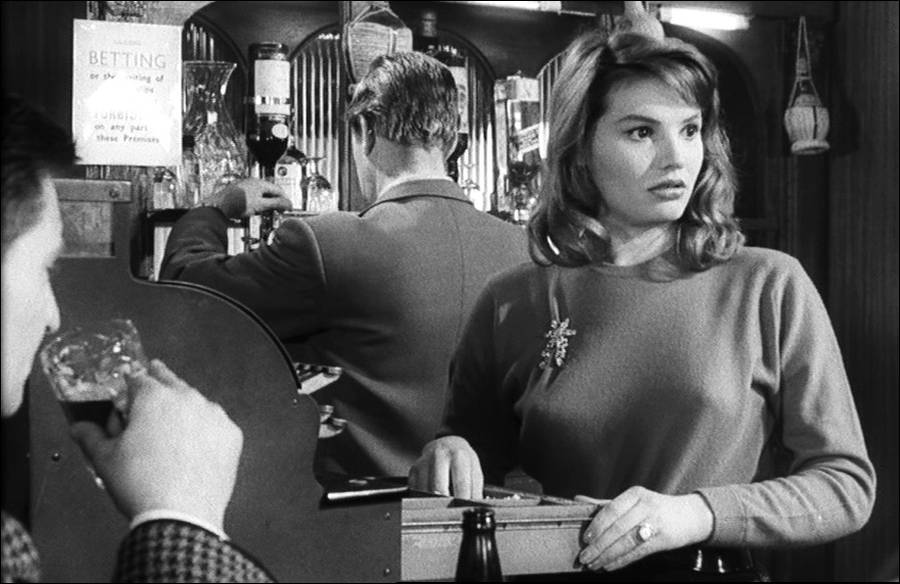A Kind of Loving movie storyline. Victor ‘Vic’ Brown (Alan Bates) is a draughtsman in a Manchester factory who sleeps with a typist called Ingrid Rothwell (June Ritchie) who also works there. She falls for him but he is less enamoured of her. When he learns he has made her pregnant Vic proposes marriage and the couple move in with Ingrid’s protective, domineering mother, Mrs Rothwell (Thora Hird), who disapproves of the match. Ingrid has a miscarriage, Vic has regrets and comes home drunk. The couple then consider the possibility of making do with ‘a kind of loving’.
A Kind of Loving is a 1962 British Kitchen sink drama film directed by John Schlesinger, based on the 1960 novel of the same name by Stan Barstow. It stars Alan Bates and June Ritchie as two lovers in early 1960s Lancashire. The photography was by Denys Coop, and the music by Ron Grainer. Filming locations included the towns of Preston, Blackburn, Bolton, Salford, Manchester, Radcliffe and St Anne’s-on-Sea in the northwest of England.
The film belongs to the British New Wave movement in film, and the related genre commonly known as “kitchen sink drama”. The novel was later adapted into the 1982 television series A Kind of Loving. It was the sixth most popular film at the British box office in 1962. The film won the Golden Bear award at the 12th Berlin International Film Festival in 1962.
Film Review for A Kind of Loving
One of the most important films of the British New Wave, A Kind Of Loving owes much to the Angry Young Men of theatre. It has rarely been grimmer up north than in John Schlesinger’s tale of social obligation, shame and self-destruction – yet by uncovering the passions beneath these frustrations he turns life’s bit part players into characters in their own right. This is a story with all the components of high drama played out in a world onto which British cinema had hitherto rarely deigned to turn its gaze.
The film’s ostensible hero, Vic (Alan Bates) is a young man living with his parents and younger brother, working in a local firm, trying to get on in life – yet he’s at that age when it’s hard to pin down any certain future path, and he’s tempted to travel, to see beyond the chimney-framed horizons. This is something every man feels at some stage in his life, his father assures him. It goes without saying that women don’t.
Theirs is a very different world. Living with just her mother, Ingrid (June Ritchie) has a life bounded by the material, by televisions and chests of drawers and new coats. When she catches Vic’s eye at a wedding – a place where these two types of aspiration meet – worlds collide. The expectation in such cases is always romance; the reality, tears and misunderstandings and bits of world all over the carpet.
Vic is, by the standards of the time, a nice young man. He doesn’t share in his friends’ demeaning banter about women, though he quietly shares their conviction that the sexy ones, being unattainable, deserve to be mocked. It’s partly to avoid this kind of mockery that Ingrid has learned never to show any interest in sex, which leaves them at an impasse. He likes her but he also wants to have sex with her,and it seems difficult to reconcile the two. His resultant inconstancy, following intense displays of affection, quickly leads to her losing her heart. Ultimately she will give in.
And because it’s the early 1960s and there’s no chemical contraception and he’s too irresponsible to think of barrier methods and they both feel to guilty to discuss it, and because they have no concept of all the ways they might experience sexual pleasure without life-changing consequences, the inevitable happens. And because he’s not completely without human feeling, he marries her, and they set off on honeymoon as if they were going to a funeral.
Schlesinger’s North is constructed in smudgy shades of grey. Rain falls heavily; steam billows up from unseen trains; the streets are always wet, sometimes bright cobbles, sometimes just dirt. Smudge-faced boys run and shout, learning tribal behaviour early. In the office, women are lustily jeered at, reminded of their place. The young men chase women, the older ones flee them. There is sanctuary in the pub, with proper pint glasses and singing. It’s understandable This is a world where pleasures are few and far between; but if the women find any real pleasure in life at all, we don’t see it. A constant chatter, all about material things and other people’s lives, shields them from the prospect of meaningful conversation, perhaps meaningful thought. This, too, is understandable.
Vic and Ingrid aside, the film’s most important character is Mrs. Rothwell (Thora Hird, who turns it is most finely judged performance). As Vic’s mother in law, her role in a traditional Northern drama is clearly that of the villain, yet though Schlesinger plays up Vic’s frustration and the film is almost wholly told from his point of view, we still get glimpses behind this woman’s mask. having her home suddenly invaded by the man who ruined her daughter’s life chances, she makes a remarkable show of generosity. The rules of her society have given her few options. Critics, too, tend to monster her, seeing her as an embodiment of intrusive American values and the crushed spirit of the working class, but she must use all the tools at her disposal simply to endure.
In this situation, is there room for loving, of a kind? On a hill above the city, where the air is clear and other people’s comings and goings look small, Vic and Ingrid dare to dream. Whether or not they can really learn to value each other, even to like each other in a lasting way, is something on which viewers’ opinions will differ. If they do, of course, they will only perpetuate this misery, something born not of poverty alone but of the Hell people make or one another. Yet in the middle of it all, Schlesinger offers a spark of hope. Vic runs into the street, frantic to get to the hospital. A stranger stops a car and offers to help, no questions asked. It’s the only pure moment of love in the film. In its quiet way, it hints at a kind of salvation.
A Kind of Loving (1962)
Directed by: John Schlesinger
Starring: Alan Bates, June Ritchie, Thora Hird, Bert Palmer, Pat Keen, James Bolam, Gwen Nelson, John Ronane, Patsy Rowlands, David Mahlowe, Annette Robertson, Leonard Rossiter
Screenplay by: Keith Waterhouse, Willis Hall
Cinematography by: Denys Coop
Film Editing by: Roger Cherrill
Art Direction by: Ray Simm
Makeup Department: Anne Box, Bob Lawrance
Music by: Ron Grainer
MPAA Rating: None.
Distributed by: Anglo-Amalgamated, Governor Films
Release Date: April 12, 1962 (UK), October 1, 1962 (USA)
Views: 270








